Body Recomposition vs. Cutting: Which is Best?
It all depends on your goals.
- Cutting is the way to go if you want to lose fat.
- If you want to build muscles, a recomp is the best option.
How does body recomposition work?
Body recomposition (“recomp”) is the process of losing fat and gaining muscle simultaneously.
You can achieve this through a combination of diet and exercise.
Assume we put a typical skinny-fat beginner on a macronutrient-based diet with resistance training.
Over the course of a few months, she has done a recomp if her body weight stays about the same, her body fat percentage goes down, and she gains muscle and strength.
Is body recomposition the same as cutting?
No, body recomposition is different than cutting.
The cutting phase of bodybuilding is when athletes try to lose body fat while preserving muscle mass.
- To do this, they create a calorie deficit by reducing calorie intake and increasing calorie expenditure.
- They also adjust macronutrient ratios to promote fat loss while preserving muscle mass.
- Once the desired weight loss is reached, slowly increase calories back into the diet to keep the new, lower body weight.
Bodybuilders who bulk focus on gaining muscle, while those who cut focus on losing fat.
Because bulking and cutting are opposites, you must perform each independently.
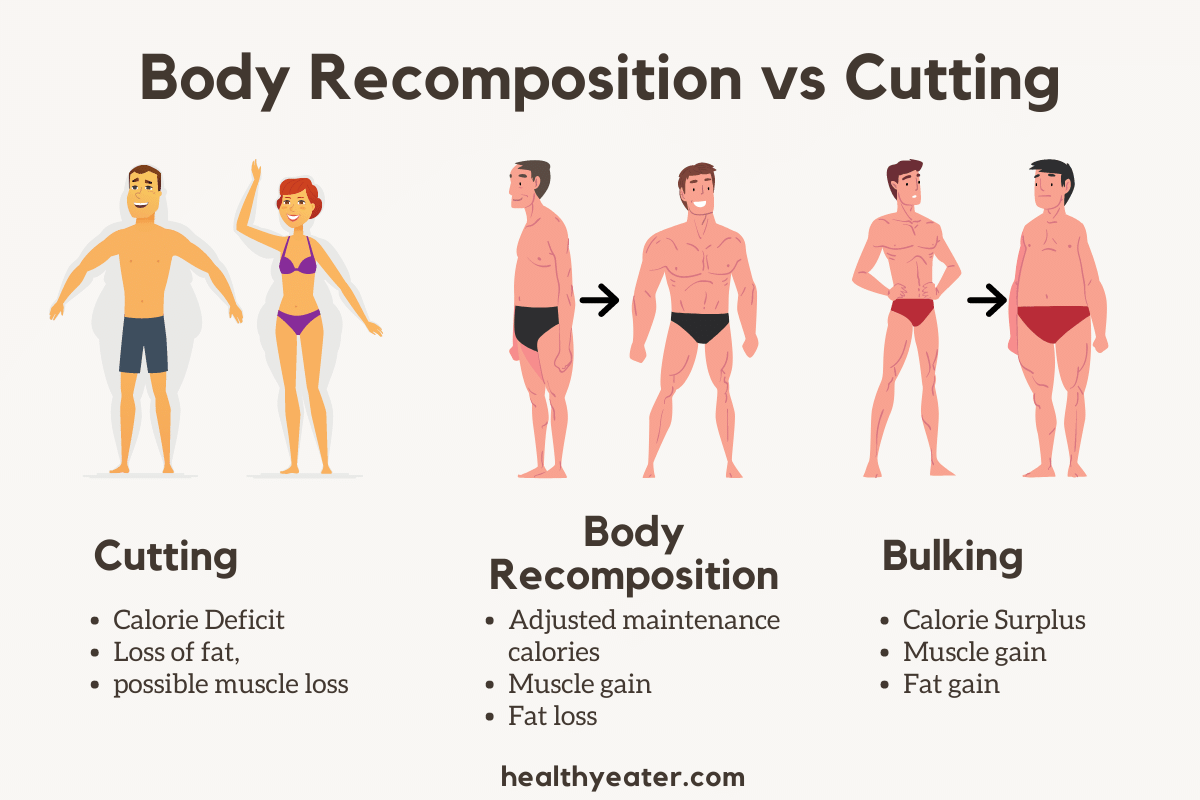
How to change your body composition without cutting
- Use the body composition calculator to figure out how many calories and macros you need daily.
- Eat more calories on the days you work out and less on days you don’t.
Coach Ted is great at helping in this way. - Do weight training twice or three times a week.
Overtraining can lead to exhaustion and a reduced ability to recover.
How long does it take?
Building muscle and losing fat takes longer to show up in your body, making it hard to track your progress.
Keeping track of your progress can be challenging because your weight isn’t likely to fluctuate much unless you’re obese.
- It would help if you took progress pictures every 2-3 weeks.
- Take skinfold measurements with fat calipers.
After eight weeks, you should start to see results.
Is cutting a better option for you?
A typical cutting diet is easier to achieve than a body recomp. Head to the macro calculator to get your personalized settings for macros and calories.
The calculator will tell you:
- How much carb, protein, and fat to eat (daily and at each meal).
- It will factor in your exercise activity and point you towards a macros-based diet to achieve optimal results.
How many calories should I cut for a body recomposition?
This is the wrong question to ask.
Body recomposition is not about calorie restriction but maintaining the correct amount of calories to fuel exercise.
Eat too little, and there will be no muscle building.
Maintaining or building muscle can be difficult on a low-calorie diet because of a hormonal imbalance (Sumithran, 2011, Barakat, 2020 ).
Again, use the recomp calculator.
After determining your daily caloric intake, you must focus on macronutrients, specifically protein.
How much protein should I consume for recomp?
A 2014 study found that after eight weeks, there were no significant differences in body composition between a high protein group and a control group, even though the high protein group ate nearly 800 more calories per day.
To put it another way, the participants didn’t have to drastically reduce their caloric intake to see results.
The body recomposition calculator will suggest the best protein levels for you. It’s based on around .95 g of protein per pound of body weight (~2 g / kg).
What are the biggest mistakes people make when trying to achieve body recomposition?
- Failing to track progress
- Not being consistent with workouts
- Following an unhealthy diet
- Not getting enough sleep
- Not drinking enough water
- Not supplementing properly
- Not taking rest days.
- Not listening to their bodies.
Is it possible?
While research suggests body recomposition is feasible, most studies were done on overweight or obese people with little to no weightlifting expertise.
Those who have lifted weights for a long time will arguably find the results less satisfactory than beginners.
Should I do cardio?
Cardio’s effects on body recomp vary depending on the method, frequency, and duration of the exercise used.
Aim for no more than 60 minutes a week.
Body Recomposition Success

We have many clients who have successfully achieved a recomp. It took consistency and commitment, but many (with the help of Coach Ted) achieved what they wanted.
Here’s the story of Abby*, one of our clients who purchased the Macro Solution.
Before counting her macros, she used to train day in and day out. She was a lifting maniac.
She was working out 5 to 6 days a week, burning 600 to 1200 calories, and consuming about 1300–1400 calories with minimal carb intake. This had been going on for years. Like most, Abby thought this was what she needed to do to trim up.
She was obsessive and unhappy when it came to food.
In 6 months after reading The Macro Solution, she lost 12 to 15 pounds and gained muscle definition.
Because she still had a lot of muscle, she thought she had lost 5 to 7 pounds. She started at 147 and weighed 132 at the end.
She ate more and worked out less. While she experienced some weight loss, she effectively achieved body recomposition.
*Not her real name.
Sources
- Barakat, C., Pearson, J., Escalante, G., Campbell, B., & De Souza, E. O. (2020). Body recomposition: can trained individuals build muscle and lose fat at the same time?. Strength & Conditioning Journal, 42(5), 7-21.
- Sumithran, P., Prendergast, L. A., Delbridge, E., Purcell, K., Shulkes, A., Kriketos, A., & Proietto, J. (2011). Long-term persistence of hormonal adaptations to weight loss. New England Journal of Medicine, 365(17), 1597-1604.
- Antonio, J., Peacock, C. A., Ellerbroek, A., Fromhoff, B., & Silver, T. (2014). The effects of consuming a high protein diet (4.4 g/kg/d) on body composition in resistance-trained individuals. Journal of the International Society of Sports Nutrition, 11(1), 19.


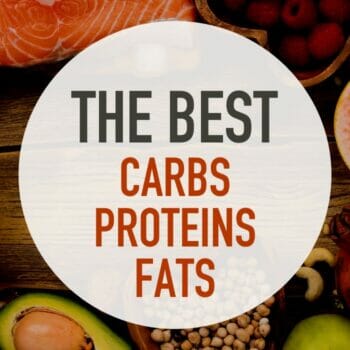 Top 15 Healthy Carb, Protein, and Fat Rich Foods
Top 15 Healthy Carb, Protein, and Fat Rich Foods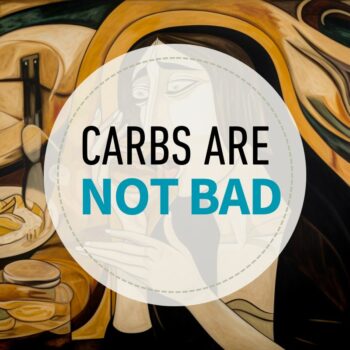 Carbs are Not Bad – and Will Not Prevent Weight Loss
Carbs are Not Bad – and Will Not Prevent Weight Loss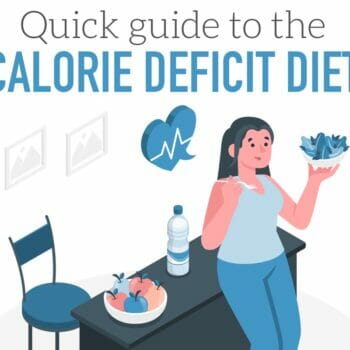 Calorie Deficit Diet
Calorie Deficit Diet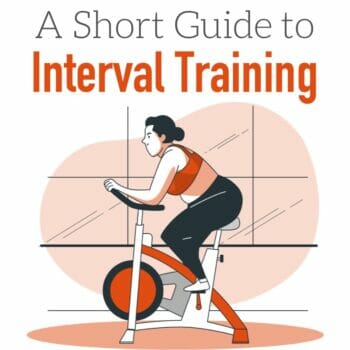 A Short Guide To High-Intensity Interval Training (HIIT)
A Short Guide To High-Intensity Interval Training (HIIT) What Causes Water Weight, Water Retention, and Weight Fluctuation?
What Causes Water Weight, Water Retention, and Weight Fluctuation?